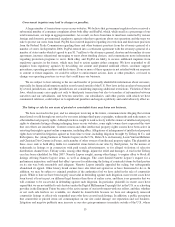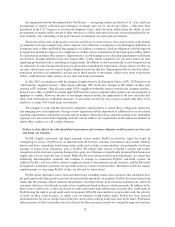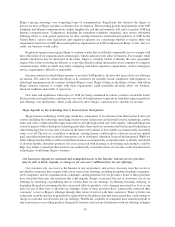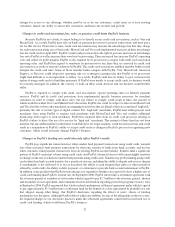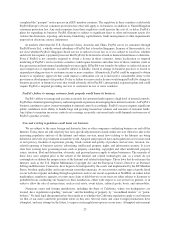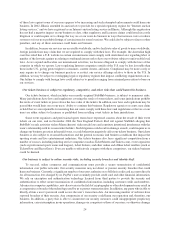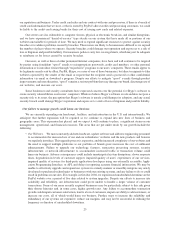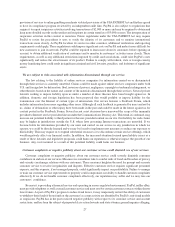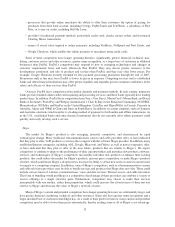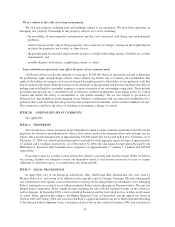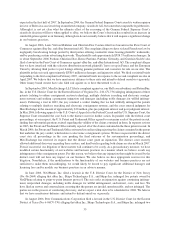eBay 2006 Annual Report Download - page 29
Download and view the complete annual report
Please find page 29 of the 2006 eBay annual report below. You can navigate through the pages in the report by either clicking on the pages listed below, or by using the keyword search tool below to find specific information within the annual report.our reputation and business. Under credit card rules and our contract with our card processors, if there is a breach of
credit card information that we store, or that is stored by PayPal’s direct credit card processing customers, we could
be liable to the credit card issuing banks for their cost of issuing new cards and related expenses.
Our servers are also vulnerable to computer viruses, physical or electronic break-ins, and similar disruptions,
and we have experienced “denial-of-service” type attacks on our system that have made all or portions of our
websites unavailable for periods of time. We may need to expend significant resources to protect against security
breaches or to address problems caused by breaches. These issues are likely to become more difficult as we expand
the number of places where we operate. Security breaches could damage our reputation and expose us to a risk of
loss or litigation and possible liability. Our insurance policies carry low coverage limits, which may not be adequate
to reimburse us for losses caused by security breaches.
Our users, as well as those of other prominent Internet companies, have been and will continue to be targeted
by parties using fraudulent “spoof” emails to misappropriate passwords, credit card numbers, or other personal
information or to introduce viruses through “trojan horse” programs to our users’ computers. These emails appear to
be legitimate emails sent by eBay, PayPal, Skype, or a user of one of those businesses, but direct recipients to fake
websites operated by the sender of the email or request that the recipient send a password or other confidential
information via email or download a program. Despite our efforts to mitigate “spoof” e-mails through product
improvements and user education, “spoof” remains a serious problem that may damage our brand, discourage use of
our websites, and increase our costs.
Some businesses and security consultants have expressed concern over the potential for Skype’s software to
create security vulnerabilities on its users’ computers. While we believe Skype’s software is safe and does not pose a
security risk to its users, the perception that Skype’s software is unsafe could hamper its adoption, and any actual
security breach could damage Skype’s reputation and expose us to a risk of loss or litigation and possible liability.
Our failure to manage growth could harm our business.
We are currently expanding our headcount, facilities, and infrastructure in the U.S. and internationally. We
anticipate that further expansion will be required as we continue to expand into new lines of business and
geographic areas. This expansion has placed, and we expect it will continue to place, a significant strain on our
management, operational, and financial resources. The areas that are put under strain by our growth include the
following:
•Our Websites. We must constantly add new hardware, update software and add new engineering personnel
to accommodate the increased use of our and our subsidiaries’ websites and the new products and features
we regularly introduce. This upgrade process is expensive, and the increased complexity of our websites and
the need to support multiple platforms as our portfolio of brands grows increases the cost of additional
enhancements. Failure to upgrade our technology, features, transaction processing systems, security
infrastructure, or network infrastructure to accommodate increased traffic or transaction volume could
harm our business. Adverse consequences could include unanticipated system disruptions, slower response
times, degradation in levels of customer support, impaired quality of users’ experiences of our services,
impaired quality of services for third-party application developers using our externally accessible Appli-
cation Programming Interface, or API, and delays in reporting accurate financial information. We may be
unable to effectively upgrade and expand our systems in a timely manner or smoothly integrate any newly
developed or purchased technologies or businesses with our existing systems, and any failure to do so could
result in problems on our sites. For example, in October 2004, we experienced unscheduled downtime on the
PayPal website over a period of five days related to system upgrades. Despite our efforts to increase site
scalability and reliability, our infrastructure could prove unable to handle a larger volume of customer
transactions. Some of our more recently acquired businesses may be particularly subject to this risk given
their shorter histories and, in some cases, higher growth rates. Any failure to accommodate transaction
growth could impair customer satisfaction, lead to a loss of customers, impair our ability to add customers, or
increase our costs, all of which would harm our business. Further, steps to increase the reliability and
redundancy of our systems are expensive, reduce our margins, and may not be successful in reducing the
frequency or duration of unscheduled downtime.
25


